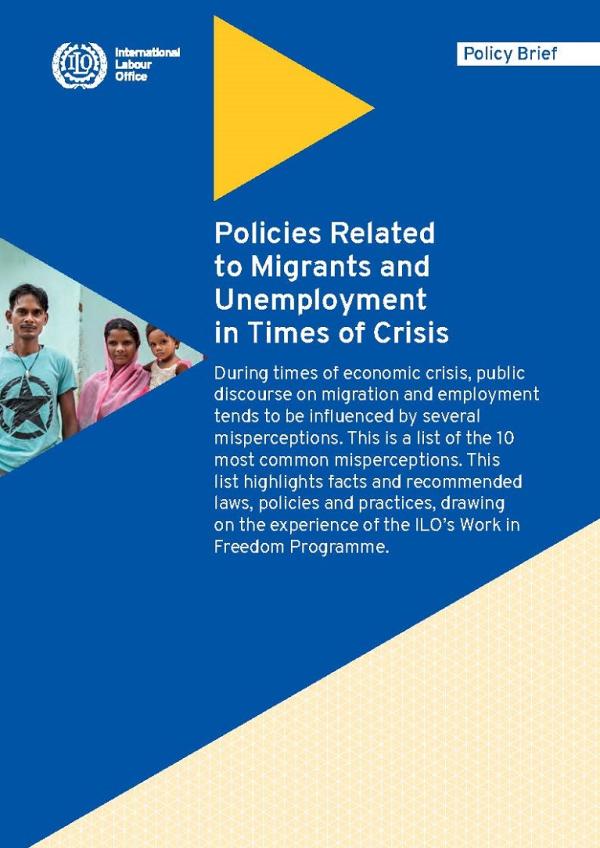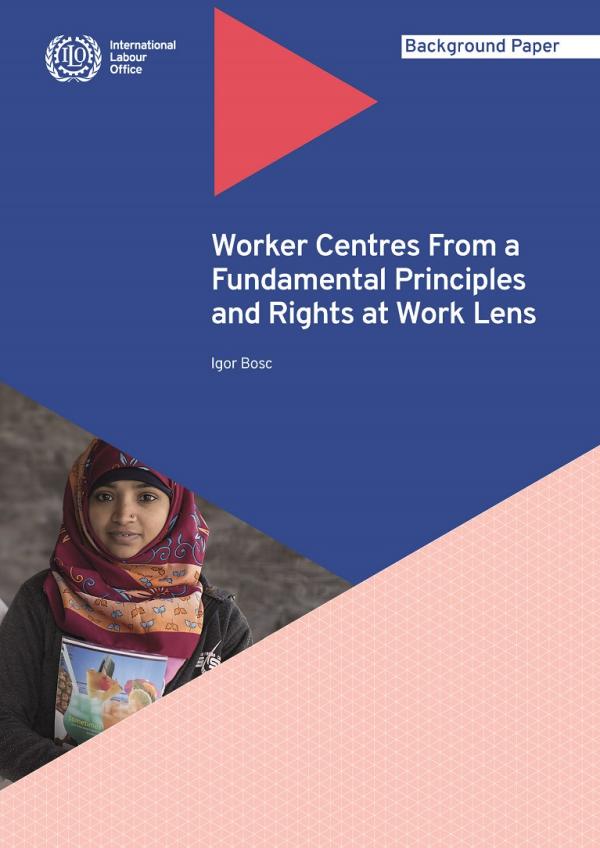ITUC Policy Brief: a new social contract for migrant workers
Decent Work deficits, xenophobia, racism and discrimination, conflicts, insufficient mitigation and adaptation to Climate Change mean many people have no choice but to accept substandard employment or undignified working conditions.
A New Social Contract is more urgent than ever to create more inclusive societies and economies, where migrants and their families can work and live with dignity. Workers call for a rights-based governance of migration that is designed, implemented and monitored through social dialogue and with international labour standards – such as freedom of association and collective bargaining rights – at the forefront.
Type of document :
Country/Region :
Year of publication :
Theme : , , , , , ,
Policy brief on policies related to migrants and unemployment in times of crisis
The purpose of this policy brief is to explain influence of misperceptions during times of economic crisis, on public discourse on migration and employment and recommend laws, policies and practices to overcome these misperceptions.
During times of economic crisis, public discourse on migration and employment tends to be influenced by several misperceptions. This is a list of the 10 most common misperceptions. This list highlights facts, recommended laws, policies and practices, drawing on the ILO’s Work in Freedom Programme. It was presented at the Kafala Reform Workshop on 11 March 2020 at Beirut, Lebanon by Mr Igor Bosc, CTA, Work in freedom Programme to the Minister of Labour and participants.
Type of document :
Country/Region : , , , ,
Year of publication :
Theme : , ,
Worker Centres from a Fundamental Principles and Rights at Work Lens
The purpose of this paper is to explain how a worker centre can also perform functions that support fundamental principles and rights at work. The paper draws on the experience of the ILO’s Work in Freedom programme in supporting worker centres in South and West Asia.
Worker centres are meant for all types of workers, however they tend to cater primarily to the needs of informal workers and migrant workers and tend to exist and be located in areas where fundamental principles and rights at work, such as non-discrimination, freedom of association and collective bargaining as enshrined in International Labour Organization (ILO) Conventions No. 111, No. 87 and No. 98, are a distant reality for both informal workers and migrant workers.
This paper draws on the experience of the ILO’s Work in Freedom programme in supporting worker centres in South and West Asia. It was presented at the ILO Anniversary Conference “Continuing the Struggle: The International Labour Organization Centenary and the Future of Global Worker Rights” held on 21–22 November 2019 in Washington, DC at a panel titled “Protecting Migrants and Refugees Working in Global Supply Chains: New Directions for the ILO.
Type of document :
Country/Region : , , , ,
Year of publication :
Theme : , , , ,
A comprehensive analysis of policies and frameworks governing foreign employment for Nepali women migrant workers and migrant domestic workers. Exploring the migration policymaking process with a specific focus on bans and restrictions on foreign employme
One of the principal causes and risk factors for forced labour and trafficking, identified by past research led by the International Labour Organization (ILO)’s Work in Freedom (WiF) Programme, is restrictive and gender-insensitive migration policies. These include restrictions on movement in the form of bans and restrictions on the departure of women migrant workers and migrant domestic workers from origin countries to seek foreign employment.
In the ILO’s efforts to support the construction of regular migration pathways for women migrant workers and migrant domestic workers which respect their safety, dignity, wellbeing and human and labour rights and which allow them to enrich their own lives, the lives of their families and communities back home, the Work in Freedom Programme of ILO Country Office for Nepal commissioned this present review between February and June 2020 as a comprehensive analysis of legal and policy frameworks governing foreign employment for women migrant workers and migrant domestic workers. This review is an update of ILO’s previous study of migration bans, 'No Easy Exit: Migration Bans Affecting Women from Nepal' published in 2015, but fills an important research gap by focusing on the policy formulation phase itself. The findings identify and characterize the ways in which stakeholders (governmental and otherwise) formulate policy narratives, negotiate policies and regulations and invoke knowledge claims in order to justify regulatory and policy interventions related to women migrant workers, migrant domestic workers and associated thematic areas – including anti-trafficking frameworks, frameworks combatting forced labour, domestic work and more.
Type of document :
Country/Region : , , ,
Year of publication :
Theme : , , , , , , , ,
Subscribe to the Fair Recruitment Initiative Newsletter
Sign up to receive news delivered to your inbox.




